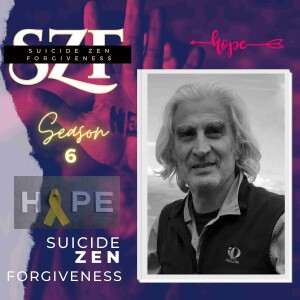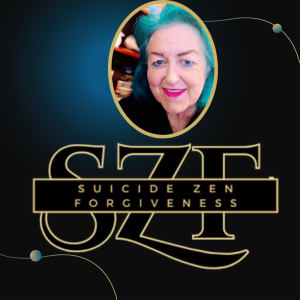
Suicide Zen Forgiveness with Richard Brockman: Personal Narrative and Neuroscience in Suicide
In this episode of 'Suicide Zen Forgiveness,' host Elaine Lindsay interviews Dr. Richard Brockman, a clinical professor at Columbia University and author of the critically acclaimed book 'Surviving Life After Death.' Drawing on his own childhood experience of losing his mother to suicide, Dr. Brockman explores the interplay between personal narratives and neuroscience in understanding the impact of suicide on survivors. With emphasis on shifting perspectives and accepting the lack of control over such events, Dr. Brockman posits that survivors can eventually come to terms with their loss and find freedom from the guilt or self-blame often associated with suicide of a loved one. This deep and insightful conversation offers valuable insights into the process of healing after such traumatic life experiences.
00:01 Introduction to Suicide Zen Forgiveness
00:14 Meet the Host: Elaine Lindsay
01:02 Introducing the Guest: Richard Brockman, MD
03:59 Richard's Personal Story: Dealing with Mother's Suicide
05:02 Exploring the Concept of Narrative and Biology of Story
05:53 Understanding Animal Memory and Story Structure
08:38 Impact of Suicide on Biological and Psychological Narrative
09:38 Exploring Individual Reactions to Trauma
10:28 Richard's Journey in Psychiatry and Neuroscience
12:26 The Unanswered Questions of Suicide
16:38 The Personal Impact of Suicide on the Survivors
17:58 Understanding the Role of Age and Gender in Suicide Impact
29:04 The Role of Control in Experiencing Trauma
32:08 Understanding Instinctive Responses
32:43 Discussing Suicide and Mental Health with Children
33:55 The Importance of Role Models and Support Systems
37:08 Dealing with Overwhelming Crises
37:37 Personal Experiences with Earthquakes
39:47 Resilience in Children vs Adults
44:38 Understanding Suicide from a Personal Perspective
51:25 The Journey of Writing a Memoir
56:08 Concluding Remarks and Future Plans
I am honoured to share my guest, Richard Brockman MD. Richard thoughtfully, shares his wealth of knowledge, as well as his very personal story. Richard is a multi-faceted and multi-talented gentleman.
When Richard Brockman found his mother’s body, the simple narrative of his childhood ended. His new book-Life After Death tells the story of a boy who died and of a man who survived when the boy and the man are one and the same. It tells a very personal—yet tragically common—story of irredeemable loss. It tells the story of story itself. How story forms. How it grows. How it changes. How it can be broken. And finally, how sometimes it can be repaired.
Now an expert in genetics, epigenetics, and the biology of attachment, Brockman chronicles his evolution from a child overwhelmed by trauma to a man who has struggled to reclaim his past. He lays bare the core of one who is both victim and healer. By weaving together childhood despair and clinical knowledge, Brockman shows how the shattered pieces of the self—though never the same and not without scars—can sometimes be put back together again.
Richard Brockman, MD is Clinical Professor, Columbia University, Vagelos College of Physicians and Surgeons, and Visiting Professor at the University of Namibia, School of Medicine.
He has written over 40 papers published in peer review journals primarily focusing neural science and clinical psychiatry. His book, A Map of the Mind, towards a science of psychotherapy was published by International Universities Press to critical acclaim. Life After Death, surviving suicide was published in August ’23 by Arcade Press/Simon&Schuster, also to critical acclaim. His teaching has been honored by the Victor J. Teichner Visiting Scholar Award, from the American Academy of Psychodynamic Psychiatry and Psychoanalysis as well as the Nancy C.A. Roeske, MD, Certificate of Recognition for Excellence in medical student education from the American Psychiatric Association.
He has lectured widely in the United States and abroad.
Brockman is also a playwright whose work has been produced in New York, Los Angeles, London as well as numerous other cities.
His articles have been published in The Atlantic Monthly, The Los Angeles Times Magazine, The Wall Street Journal, The New York Times.
A Map of the Mind, towards a science of psychotherapy was published by International Universities Press.
Life After Death, surviving suicide was published in August ’23 by Arcade Press/Simon & Schuster.
More Episodes
 2022-09-20
2022-09-20
 19
19
 2022-08-30
2022-08-30
 10
10
 2022-04-26
2022-04-26
 21
21
 2022-03-15
2022-03-15
 28
28
 2022-03-01
2022-03-01
 19
19
 2022-02-15
2022-02-15
 15
15
 2022-02-07
2022-02-07
 11
11
 2022-01-21
2022-01-21
 16
16
 2022-01-21
2022-01-21
 19
19
 2022-01-21
2022-01-21
 11
11
 2021-10-12
2021-10-12
 12
12
 2021-10-05
2021-10-05
 11
11
 2021-09-28
2021-09-28
 16
16
 2021-09-21
2021-09-21
 26
26
 2021-09-14
2021-09-14
 14
14
Create your
podcast in
minutes
- Full-featured podcast site
- Unlimited storage and bandwidth
- Comprehensive podcast stats
- Distribute to Apple Podcasts, Spotify, and more
- Make money with your podcast
It is Free
- Privacy Policy
- Cookie Policy
- Terms of Use
- Consent Preferences
- Copyright © 2015-2024 Podbean.com






